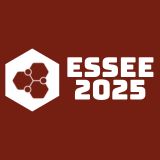TOPICS
ESSEE2025 will be focusing on different topics related to Electrochemical Engineering, such as the following.
Fundamentals of electrochemical engineering
Introduction to electrode reactions: electrochemical cells, electrochemical reactions, oxidation-reduction, anode-cathode, units, conventions, Faraday law, current efficiency.Thermodynamics: cell potential, standard potentials, equilibrium, Gibbs free energy, reference electrodes, double layers, electrode potential, Nernst equation, examples of electrochemical processes.
Kinetics, electron transfer understanding voltammetry: Butler-Volmer equation and derived forms (overpotential, kinetic parameters), BV approximations at high and low overpotential (linear equations, Tafel). Electrocatalysis applications.
Mass transport: chemical rate-flux relation, molar flux expressions, mass transport modes, examples. First Fick’s law, simplified limiting current approach/ mixed control (kinetic + mass transport) /derived form of the Butler-Volmer law-applications, migration flux, electrolyte conductivity, supporting electrolyte, mobility, transference number -microscopic 'mass' and 'charge' balances, simplified forms and derived laws of: Ohm, Nernst-Planck, Laplace, Fick, Forced convection effects, laminar and turbulent flow, mass transport correlations, effects of gas bubbles.
Electrochemical reactor engineering
Electrode structures: porous electrodes, current and potential distribution, transfer in heterogeneous media (porous electrodes, polymeric organic and mineral membranes, conductive additives into the bulk)Electrochemical reactor and components: electrode materials and components for reactors building, monopolar/bipolar cells, three-dimensional electrodes, gas diffusion electrodes. Fundamental relations: yields /conversion, cell voltage, power and energy consumption, investment costs vs running costs.
Membranes: divided/undivided cells, membranes, and separators.
Electrocatalysis: the art of accelerating electron transfer.
Parallel plate reactors: macroscopic mass balance for Batch, plug flow, CSTR, under potentiostatic, galvanostatic and constant cell voltage modes. Specific set-ups (coupled tank, recycling) under galvanostatic conditions.
Industrial electrochemistry: choro-alkali cells, electrosynthesis of adiponitrile, cathodic side reactions, and anodic side reactions, other industrial processes.
Electrochemical storage of energy
Batteries: principles, primary/secondary batteries, cell voltages, storage capacity-power/energy, Galvanic yield, cycling, Ragone diagram, battery design, battery management, mechanical properties, flow batteries, electric vehicles.Fuel cells: types of fuel cells, I-E properties, cell stack configurations, components, water management, mechanical properties.
Capacitors: fundamentals; supercapacitors, applications.
Green hydrogen production and use
Introduction Hydrogen as energy carrierLow temperature electrolysis: Alkaline electrolysers, PEM Electrolysers, AEM Electrolysers.
High temperature electrolysis: SOEC
Hydrogen system engineering: integration of electrolysis in energy systems, power-to-power applications
Hydrogen to Chemicals: e-fuels and e-chemicals, fundamentals and applications, hydrogen in process electrification
New applications of electrochemical technologies
Reduction of carbon dioxide and co-electrolysis: fundamentals, electrochemical reactors.
Advanced oxidation processes: principles, applications, types of reactors and electrodes.
Electrocoagulation & soil remediation: electro-flocculation, introduction to soil electro-remediation / electrophoresis
Desalination by Electrodialysis:fundamentals and applications
Bio-electrochemical processes: fundamentals and applications
Photo-electrochemical processes: fundamentals and applications

